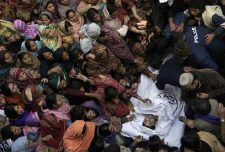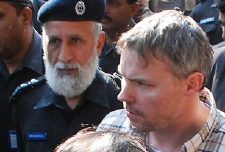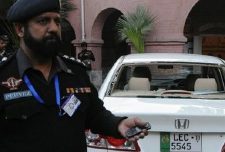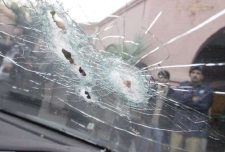
The Case of Raymond Davis |
The Case of Raymond Davis
NADEEM MALIK پاکستان کا کہناہے کہ ریمنڈڈیوس کا معاملہ عدالت میں زیر سماعت ہے، اس لئے اس پر کوئی تبصرہ یارائے نہیں دی جاسکتی ،عدالت جوبھی فیصلہ کرے گی اس کا احترام کیا جائے گا. امریکی سفارتخانے نے ریمنڈ ڈیوس کی گرفتاری کو غیر قانونی قرار دیتے ہوئے اس کی فوری رہائی کا مطالبہ کر دیا ہے اور کہا ہے کہ ریمنڈڈیوس کی گرفتاری غیر قانونی اورویانا کنونشن کی خلاف ورزی ہے
The (Very) Strange Case of Raymond Davis
Adil Najam
Strangely, the more we get to know about the case of Raymond Davis (linked with a US firm http://hyperion-protective.com/index.html), the less we seem to know. Even more strangely, the fact that the entire incident happened in broad daylight and in front of dozens of witnesses seems is itself confusing the facts rather than adding clarity. Moreover, it seems that no one seems to want to get much clarity either; although different parties may want different parts of the story to ‘disappear.’ The incident was rather eerie and disturbing to begin with; and it continues to become more so.




Strangely, the more we get to know about the case of Raymond Davis (linked with a US firm http://hyperion-protective.com/index.html), the less we seem to know. Even more strangely, the fact that the entire incident happened in broad daylight and in front of dozens of witnesses seems is itself confusing the facts rather than adding clarity. Moreover, it seems that no one seems to want to get much clarity either; although different parties may want different parts of the story to ‘disappear.’ The incident was rather eerie and disturbing to begin with; and it continues to become more so.




Here is what one does know. Raymond Davis, a staff member of the US Consulate in Lahore shot two Pakistani men dead on Thursday in a crowded part of Lahore (Mozang Chowk), according to him in self-defense. A US Consulate vehicle that rushed in to ‘rescue’ Mr. David then ran over a third person, who also died. A murder case was then registered against Raymond Davis, who was handed into police custody. A case has also been registered against the driver of the US Consulate vehicle that ran over a third person, but the driver has not yet been apprehended. After a fair deal of scrambling by both US and Pakistani officials on what to do or say, the positions of both have now started becoming clear and they have taken the stance that is usually taken in such cases: the US is asking that Raymond Davis, as a diplomatic functionary, should be handed back to them; Pakistan seems to be responding that the matter is sub judice and should take its course.
Beyond that, there are more questions than answers. For most part, these questions fall into three categories: (1) Questions about who is Raymond Davis? (2) Questions about exactly what happened at Mozang, Lahore? (3) Questions about what should happen now ?
On the first question, earliest reports suggested that Raymond Davis was a “technical adviser” and a “consular” official. More recently, US Embassy officials have described him as a “functionary” of the Embassy assigned to the US Consulate in Lahore and carrying a US Diplomatic passport. Reportedly he was hired at the US Consulate in Lahore as a security contractor from a Florida-based firm Hyperion Protective Consultants. All of this has material relevance to whether he would enjoy diplomatic immunity or not, but even more because of the apprehensions of many Pakistanis that he could be linked to the CIA or to the infamous firm Blackwater (later renamed XE Services).
And that leads squarely to the second question: what exactly was happening at Mozang? Very much in line with the immediate knee-jerk reaction of many Pakistanis, an early commentary by Jeff Stein in The Washington Post seemed to suggest rather fancifully that the shootout could have been a“Spy rendezvous gone bad?” That would be a conspiracy theory, but not an entirely implausible one. Mozang is not a part of town that you would expect too many foreigners, let alone a US official, visiting; and certainly not in what was reportedly a rented private vehicle. And while Pakistan today is clearly an unsafe place, the question of just why an Embassy official was carrying a firearm be wished away. On the other hand, however, Mr. Davis claims that he shot in self defense as the two men on the motorcycle were trying to rob him at gun point. Anyone who knows Pakistan knows all too well that this, too, is entirely possible. TV footage and reports coming immediately after the incident showed one of the young men lying dead with a revolver and wearing an ammunition belt. And certainly, the question of why at least one of the two young men on the motorcycle was carrying a loaded firearm cannot be wished away just because he had “dushmani.” Indeed, serious questions need to be asked about just who the two young men on the motorcycle were, just as they need to be asked about who Raymond Davis is. There just seem to be too many unnecessary weapons in too much proximity in this story. All of the many explanations that are floating around are very disturbing, but also very plausible. Which is exactly why this story is even more dangerous if left unresolved.
Finally, the third question – which is now getting the most attention – about what should happen now. Much is being made – maybe too much –about the Vienna Convention and its implications for diplomatic immunity. Familiar diplomatic games about the minutia of vocabulary are being played and will in most likelihood result in all too familiar results. That is exactly what one would expect in any such situation anywhere. But this is not ‘any‘ situation’; and this is not ‘anywhere‘. This is about US-Pakistan relations: there is just about nothing that the US can say or do which Pakistanis are likely to believe, and there is just about nothing that Pakistan can say or do which Americans are likely to trust. Which is why getting stuck in the intricacies of the Vienna Convention of 1963 is the exact wrong place to get stuck. This is a time for public diplomacy: certainly from the US and maybe even from Pakistan. It is not in America’s interest to be seen to be standing in the way of justice and due process. And it is not in Pakistan’s interest to be seen to conducting a flawed process of justice. There are too many people on the extreme in both countries who will not and cannot to change their opinion and apprehensions about the other. But there are even more people in both countries who could all too easily be swayed to the extremes on distrust if this delicate case is not handled with clarity and transparency by both countries. Doing so will probably bring with it more than just a little diplomatic embarrassment. Not doing so can only bring worse in the tinderbox that is US-Pakistan relations.
And that leads squarely to the second question: what exactly was happening at Mozang? Very much in line with the immediate knee-jerk reaction of many Pakistanis, an early commentary by Jeff Stein in The Washington Post seemed to suggest rather fancifully that the shootout could have been a“Spy rendezvous gone bad?” That would be a conspiracy theory, but not an entirely implausible one. Mozang is not a part of town that you would expect too many foreigners, let alone a US official, visiting; and certainly not in what was reportedly a rented private vehicle. And while Pakistan today is clearly an unsafe place, the question of just why an Embassy official was carrying a firearm be wished away. On the other hand, however, Mr. Davis claims that he shot in self defense as the two men on the motorcycle were trying to rob him at gun point. Anyone who knows Pakistan knows all too well that this, too, is entirely possible. TV footage and reports coming immediately after the incident showed one of the young men lying dead with a revolver and wearing an ammunition belt. And certainly, the question of why at least one of the two young men on the motorcycle was carrying a loaded firearm cannot be wished away just because he had “dushmani.” Indeed, serious questions need to be asked about just who the two young men on the motorcycle were, just as they need to be asked about who Raymond Davis is. There just seem to be too many unnecessary weapons in too much proximity in this story. All of the many explanations that are floating around are very disturbing, but also very plausible. Which is exactly why this story is even more dangerous if left unresolved.
Finally, the third question – which is now getting the most attention – about what should happen now. Much is being made – maybe too much –about the Vienna Convention and its implications for diplomatic immunity. Familiar diplomatic games about the minutia of vocabulary are being played and will in most likelihood result in all too familiar results. That is exactly what one would expect in any such situation anywhere. But this is not ‘any‘ situation’; and this is not ‘anywhere‘. This is about US-Pakistan relations: there is just about nothing that the US can say or do which Pakistanis are likely to believe, and there is just about nothing that Pakistan can say or do which Americans are likely to trust. Which is why getting stuck in the intricacies of the Vienna Convention of 1963 is the exact wrong place to get stuck. This is a time for public diplomacy: certainly from the US and maybe even from Pakistan. It is not in America’s interest to be seen to be standing in the way of justice and due process. And it is not in Pakistan’s interest to be seen to conducting a flawed process of justice. There are too many people on the extreme in both countries who will not and cannot to change their opinion and apprehensions about the other. But there are even more people in both countries who could all too easily be swayed to the extremes on distrust if this delicate case is not handled with clarity and transparency by both countries. Doing so will probably bring with it more than just a little diplomatic embarrassment. Not doing so can only bring worse in the tinderbox that is US-Pakistan relations.
By way of background, the foundation for this principle was laid down in the Vienna Convention on Diplomatic Relations, 1961, which is considered the most important international agreement on diplomatic immunity. The relevant part of Article 31 of this Convention sets out the immunity of a diplomatic agent from the criminal jurisdiction of the country in which the diplomatic agent is working. A diplomatic agent has been defined in Article 1 of the convention as the head of the mission or a member of the diplomatic staff of the mission which includes administrative, technical and service staff of the mission.
Lahore shootout: Spy rendezvous gone bad?
By Jeff Stein
A senior former U.S. diplomatic security agent suggested Thursday that the American involved in a fatal shootout in Lahore, Pakistan, was the victim of a spy meeting gone awry, not the target of a robbery or car-jacking attempt.
"It looks like an informant meet gone bad more than a car-jacking attempt,” said Fred Burton, a former deputy chief of the U.S. Diplomatic Security Service’s counter-terrorism division.
Early reports were sketchy. Many said the American, identified in the Pakistani press variously as Raymond David, or just “Davis,” had shot two armed men on a motorcycle “in self defense” as they approached his car in a robbery attempt. As the American sped away, another Pakistani on a motorcycle was killed, according to the reports.
[SATURDAY UDATE: Embassy officials have identified the man as Raymond A. Davis. A senior U.S. official quoted by The Post said Davis was a "permanent diplomat" who was assigned to the U.S. Embassy in Islamabad as a security officer, a role the official described as "a guy who is in the protection of people."]
A Lahore police official earlier told The Post that “another U.S. vehicle was traveling with the sedan and that the American then fled the scene in that car. As it sped away, it hit a motorcyclist, killing him.”
Pakistan's GEO TV broadcast a photo of a broad-faced, 40-something man in a plaid shirt sitting in the back of a police car, who it identified as the American involved in the shootout.
According to Burton, who worked on several major terrorism cases in the 1980s and 1990s, the incident showed that David “had outstanding situational awareness to recognize the attack unfolding and shoot the other men.”
“It shows a high degree of firearms discipline and training,” Burton added. “Either the consulate employee's route was compromised by terrorist or criminal surveillance, or it's feasible he was set up in some sort of double-agent operation, if this wasn't a criminal motive.”
David was quickly apprehended and surrendered a Beretta pistol and three cell phones, according to local reports quoting police. He remains in custody.
No immediate explanation was given for David’s presence in Lahore’s Qartaba Chowk area, a mixed commercial and residential where two major roads meet.
“Even if U.S. officials are cleared of wrongdoing,” The Post correspondents reported, “the incident could be explosive in a nation where anti-American sentiment is strong. Some Pakistani news channels covering the episode raised the possibility that the Americans involved were employees of Blackwater, an American security contractor, now known as Xe Services, that is widely viewed in Pakistan as a sort of mercenary agency.”
A senior former U.S. diplomatic security agent suggested Thursday that the American involved in a fatal shootout in Lahore, Pakistan, was the victim of a spy meeting gone awry, not the target of a robbery or car-jacking attempt.
"It looks like an informant meet gone bad more than a car-jacking attempt,” said Fred Burton, a former deputy chief of the U.S. Diplomatic Security Service’s counter-terrorism division.
Early reports were sketchy. Many said the American, identified in the Pakistani press variously as Raymond David, or just “Davis,” had shot two armed men on a motorcycle “in self defense” as they approached his car in a robbery attempt. As the American sped away, another Pakistani on a motorcycle was killed, according to the reports.
[SATURDAY UDATE: Embassy officials have identified the man as Raymond A. Davis. A senior U.S. official quoted by The Post said Davis was a "permanent diplomat" who was assigned to the U.S. Embassy in Islamabad as a security officer, a role the official described as "a guy who is in the protection of people."]
A Lahore police official earlier told The Post that “another U.S. vehicle was traveling with the sedan and that the American then fled the scene in that car. As it sped away, it hit a motorcyclist, killing him.”
Pakistan's GEO TV broadcast a photo of a broad-faced, 40-something man in a plaid shirt sitting in the back of a police car, who it identified as the American involved in the shootout.
According to Burton, who worked on several major terrorism cases in the 1980s and 1990s, the incident showed that David “had outstanding situational awareness to recognize the attack unfolding and shoot the other men.”
“It shows a high degree of firearms discipline and training,” Burton added. “Either the consulate employee's route was compromised by terrorist or criminal surveillance, or it's feasible he was set up in some sort of double-agent operation, if this wasn't a criminal motive.”
David was quickly apprehended and surrendered a Beretta pistol and three cell phones, according to local reports quoting police. He remains in custody.
No immediate explanation was given for David’s presence in Lahore’s Qartaba Chowk area, a mixed commercial and residential where two major roads meet.
“Even if U.S. officials are cleared of wrongdoing,” The Post correspondents reported, “the incident could be explosive in a nation where anti-American sentiment is strong. Some Pakistani news channels covering the episode raised the possibility that the Americans involved were employees of Blackwater, an American security contractor, now known as Xe Services, that is widely viewed in Pakistan as a sort of mercenary agency.”
UN Convention on Diplomatic Relations
http://untreaty.un.org/ilc/texts/instruments/english/conventions/9_1_1961.pdf
http://untreaty.un.org/ilc/texts/instruments/english/conventions/9_1_1961.pdf
UN Convention on Consular Relations
http://untreaty.un.org/ilc/texts/instruments/english/conventions/9_2_1963.pdf
http://untreaty.un.org/ilc/texts/instruments/english/conventions/9_2_1963.pdf
| |||||||||||
لاہور… ڈپٹی پراسکیوٹر جنرل رانا بختیار نے کہا ہے کہ ریمنڈ ڈیوس کا اقدام سیلف ڈیفنس نہیں تھا،جنیوا کنونشن کے تحت صرف اس سفارتکار کو استثنیٰحاصل ہے جو سرکاری ڈیوٹی پر ہو۔لاہور میں میڈیا سے گفتگو کرتے ہوئے رانا بختیار کا کہنا تھا کہ گولیاں اگر پیچھے سے لگیں تو یہ سیلف ڈیفنس نہیں ہوتا۔ انہوں نے بتایا کہ ریمنڈ ڈیوس سفارتکار نہیں،یہ وزٹ ویزے پر پاکستان میں تھا۔اس کو استثنیٰ نہیں دیا جا سکتا۔


امریکی حکومت نے تین نوجوانوں کو قتل کرنے والے اپنے شہری کو واپس مانگا تو کوئی سیاستدان نہیں بولا: الطاف حسین ایم کیو ایم



























No comments:
Post a Comment